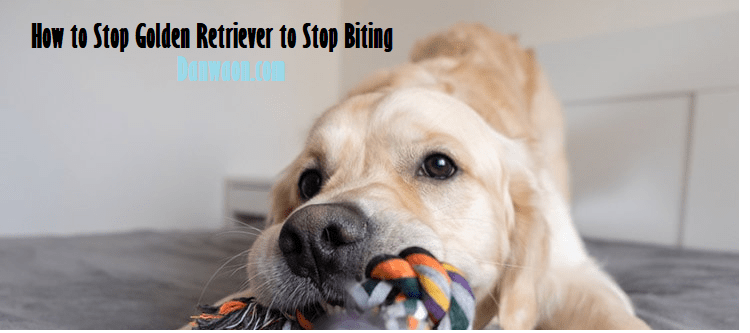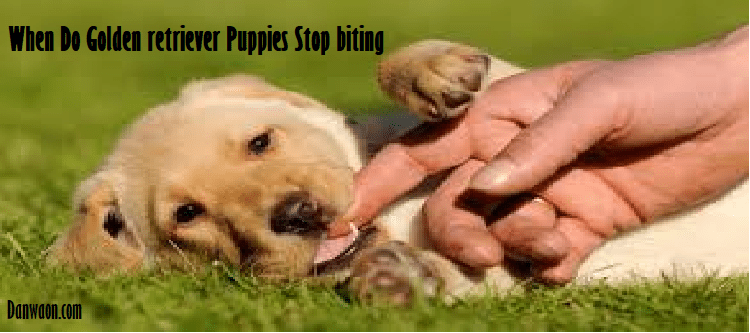When do Golden Retrievers Stop Biting: Tips And Tricks
When do Golden Retrievers Stop Biting? If you are worrying about this question then this is the ultimate guide to stopping Golden Retriever biting, also Here are some Tips, Tricks, and Training Methods for you.
When do Golden Retrievers Stop Biting?
Golden Retrievers are one of the most beloved dog breeds, known for their friendly demeanor and loyal personality. However, like all puppies, Golden Retrievers go through a biting phase as they start teething, which can be challenging for new dog owners. In this article, we’ll answer the question, “When do Golden Retrievers stop biting?” and provide tips on how to deal with this behavior.

Golden Retrievers typically start teething at around 3 months to 4 months of age, when they will begin to chew and bite on various objects to relieve the discomfort caused by their teething. During this time, it’s not uncommon for them to nip at people or other animals, as they explore the world around them.
As Golden Retrievers grow and mature, their biting behavior should decrease and eventually stop altogether. By the time they reach six months, most Golden Retrievers should have stopped biting or mouthing, although some may continue until they are around one year old.
Is your Golden Retriever still biting after six months of age?
If your Golden Retriever is still biting after six months of age then this is alarming, it’s essential to address this behavior through proper training and socialization. Consistent training, positive reinforcement, and socialization with other dogs and people can help prevent or reduce biting behavior in Golden Retrievers.
Golden Retrievers typically stop biting or mouthing by the time they reach six months, although some may continue until they are around one year old. Remember to be patient and consistent in your training efforts, and your Golden Retriever will grow into a well-behaved and beloved companion.
How to Teach a Golden Puppy Not to Bite
How to teach a Golden puppy not to bite is an essential part of their training, as it can prevent aggressive behavior and ensure that they grow up to be well-behaved adult dogs. Here are some tips on how to teach a puppy not to bite:

Provide appropriate chew toys
Puppies have a natural urge to chew, so providing them with appropriate chew toys can help satisfy this need and prevent them from biting on inappropriate objects or people.
Use positive reinforcement
When your puppy behaves well and doesn’t bite, praise them and reward them with treats or toys. Positive reinforcement is a powerful training technique that encourages good behavior and strengthens the bond between you and your puppy.
Redirect their attention
When your puppy starts to bite, redirect their attention to an appropriate chew toy or engage them in a game of fetch or tug-of-war. This can help prevent them from biting on inappropriate objects or people.
Socialize your puppy
Exposing your puppy to other dogs and people can help them learn appropriate behavior and prevent them from becoming aggressive. Socialization should be done gradually and in a controlled environment to prevent your puppy from becoming overwhelmed.
Use a firm “no” command
When your puppy bites or nips, use a firm “no” command to let them know that their behavior is not acceptable. Be consistent in your use of this command, and eventually, your puppy will learn what it means.
Seek professional help
If your puppy’s biting behavior is persistent or aggressive, seek the help of a professional dog trainer or behaviorist. They can assess your puppy’s behavior and provide you with specific training techniques to address the issue.
What is Bite Inhibition in Dogs?
Bite inhibition in dogs refers to a dog’s ability to control the force of its bite. It’s an essential skill that puppies learn during their socialization period, typically between 3 and 14 weeks of age. During this time, puppies play and interact with other puppies and adult dogs, learning to control the force of their bite through trial and error.
Puppies who have developed good bite inhibition in Dogs know how to use their mouth without causing harm. They have learned to control the force of their bite and understand that biting too hard can cause pain. This skill is important because it allows dogs to play and interact with other dogs and humans without causing harm.
If a puppy does not develop good bite inhibition in Dogs, it may grow up to be a dog that bites too hard, causing injury to other dogs or humans. This can be dangerous, especially if the dog becomes aggressive or fearful.
It’s important to note that while bite inhibition is essential, it does not mean that a dog will never bite. All dogs have the potential to bite, and it’s important to teach them appropriate behavior and socialization from a young age.
How to teach bite inhibition
Teaching bite inhibition to a puppy is an important part of their training. Here are some steps to follow to teach your puppy bite inhibition.

Start early: Begin teaching your puppy bite inhibition as early as possible, ideally between 3 and 14 weeks of age.
Socialize your puppy: Socialize your puppy with other puppies and adult dogs, as this will help them learn how to play and interact appropriately.
Use positive reinforcement: Use positive reinforcement to encourage good behavior. When your puppy licks instead of biting or nipping, praise and reward them with treats or toys.
Yip or say “ouch” when your puppy bites too hard: If your puppy bites too hard during playtime, yip or say “ouch” in a high-pitched tone to mimic the sound of another puppy. This will signal to your puppy that their bite was too hard, and they will learn to control the force of their bite.
Stop playing when your puppy bites too hard: If your puppy continues to bite too hard, stop playing with them and walk away. This will teach them that biting too hard results in the end of playtime.
Be consistent: Consistency is key when teaching bite inhibition. Reinforce good behavior and respond consistently to bad behavior to help your puppy understand what is and isn’t acceptable.
Practice regularly: Practice bite inhibition regularly by playing with your puppy and monitoring their behavior. This will help reinforce good behavior and prevent bad habits from developing.
teaching bite inhibition to a puppy requires patience, consistency, and positive reinforcement. By socializing your puppy, using positive reinforcement, yipping or saying “ouch” when your puppy bites too hard, stopping play when necessary, and practicing regularly, you can teach your puppy to control the force of their bite and prevent them from causing harm during playtime or interactions with other dogs and humans.
What if my Golden Retriever puppy is still biting after the teething phase?
If your Golden Retriever puppy is still biting after the teething phase, it’s important to address the behavior to prevent it from becoming a long-term problem. Here are some steps you can take:
If your Golden Retriever puppy is still biting after the teething phase, it’s important to address the behavior to prevent it from becoming a long-term problem. Providing appropriate chew toys, increasing exercise and playtime, using positive reinforcement, redirecting their attention, using a firm “no” command, and seeking professional help if necessary are all effective strategies to help your puppy learn appropriate behavior and prevent excessive biting.
How long do golden retriever puppies bite for
Golden Retriever puppies typically begin teething between three and four months of age, and the teething phase can last until they are six to eight months old. During this time, they may be more prone to biting and chewing as a way to relieve the discomfort in their gums.
However, biting is a natural behavior for puppies, and they may continue to exhibit this behavior even after the teething phase is over. The duration of this behavior varies from puppy to puppy, and it can be influenced by various factors such as training, socialization, and exercise. If you are worried about When do Golden Retrievers Stop Biting? then this will help you.

With proper training and socialization, you can help your Golden Retriever puppy learn bite inhibition and reduce the frequency and intensity of their biting. It’s important to be consistent in your training and provide plenty of positive reinforcement for good behavior. By doing so, you can teach a Golden Puppy not to bite.
Why Do Golden Retrievers Bite?
Golden Retrievers, like all dogs, have a natural tendency to bite and chew as a way to explore their environment, relieve stress or boredom, and satisfy their natural instinct to hunt and play.
Here are some common Why Do Golden Retrievers Bite?
Teething: As puppies, Golden Retrievers go through a teething phase, which can cause discomfort and pain in their gums. To alleviate the discomfort, puppies may chew and bite on objects, including fingers, hands, and other body parts.
Play: Golden Retrievers are social and active dogs that love to play. Playtime often involves biting and nipping, which is a natural part of their behavior.
Fear or anxiety: When Golden Retrievers feel scared or anxious, they may exhibit aggressive behavior, including biting, as a way to defend themselves.
Lack of training: Golden Retrievers require proper training to learn appropriate behavior. Without proper training, they may exhibit unwanted behaviors, including biting.
Health issues: In some cases, biting may be a sign of underlying health issues, such as pain or discomfort, and should be checked by a veterinarian.
It’s important to identify the root cause of Why Do Golden Retrievers Bite? and biting behavior to address the issue effectively. Proper training, socialization, and providing appropriate chew toys can help prevent excessive biting and help your Golden Retriever learn appropriate behavior.
Golden retriever puppy behavior stages
Golden Retrievers, like all dogs, go through different developmental stages as they grow and mature. While each stage has its own unique challenges, there is not necessarily one specific age that is most difficult for Golden Retrievers.

Here are some key developmental stages for Golden Retrievers:
Puppyhood (0-12 months): During this stage, Golden Retriever puppies go through the teething phase and learn important social and behavioral skills. They may exhibit excessive chewing, biting, and jumping behaviors.
Adolescence (6-18 months): Golden Retrievers reach sexual maturity during this stage and may exhibit signs of increased independence and stubbornness. They may also test boundaries and display unwanted behaviors, such as digging, barking, or escaping.
Adulthood (1-7 years): During this stage, Golden Retrievers are fully grown and matured. They may become less active and playful and may experience age-related health issues.
Senior years (7 years and older): Golden Retrievers are considered senior dogs at this stage, and they may experience health issues such as arthritis, decreased mobility, and cognitive decline.
While each developmental stage has its own challenges, proper training, socialization, and exercise can help prevent unwanted behaviors and promote healthy development. It’s important to provide your Golden Retriever with proper care and attention throughout its lifespan to ensure a happy and healthy life.
FAQS about When do Golden Retrievers Stop Biting
Do All Golden Retriever Puppies Bite?
Yes, all Golden Retriever puppies bite. Biting is a natural behavior for puppies, and Golden Retrievers are no exception. As puppies, Golden Retrievers use their mouths to explore their environment and play with their littermates. They may also bite as a way to alleviate the discomfort caused by teething.
However, it’s important to teach your Golden Retriever puppy bite inhibition and appropriate chewing behavior to prevent excessive and unwanted biting. It’s important to note that while biting is a natural behavior for puppies, excessive and aggressive biting can be a sign of underlying issues, such as fear, anxiety, or aggression.
Do Golden Retrievers get aggressive with age?
While Golden Retrievers are generally known for their friendly and gentle nature, any dog has the potential to become aggressive, regardless of their breed. However, Golden Retrievers are not considered an aggressive breed, and aggression is not a common trait in their temperament. In fact, Golden Retrievers are known for their loyalty, sociability, and affectionate nature.
It’s important to note that aggressive behavior in Golden Retrievers is not a common trait, and it is not a natural part of their temperament. If you notice any signs of aggressive behavior in your Golden Retriever, it’s important to seek the help of a professional dog trainer or behaviorist to address the issue effectively.
Do golden retrievers bite their owners?
No, golden retrievers typically do not bite their owners. Golden retrievers are known for their friendly and gentle temperament, and they are not typically aggressive or prone to biting but we can’t ignore the Bite Inhibition in Dogs. However, like all dogs, golden retrievers may bite in certain situations, such as when they feel threatened, scared, or provoked.
Do Golden Retriever bites hurt?
Golden retrievers have a reputation for being gentle and friendly dogs, and their bites are typically not very painful. However, it’s important to remember that all dogs have the potential to bite, and even a gentle dog like a golden retriever can cause injury if they feel threatened, scared, or provoked.
10 Dogs That Look Like Golden Retrievers: A Comprehensive Guide
Can We Use Golden Retrievers As Service Dogs?
Male Vs Female Golden Retriever| 9 Key Differences To Pick Best Dog Breed

